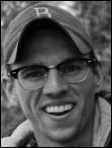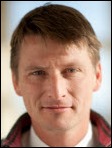I'd never heard of Healwell before and took a look over their offerings. Has anyone used the products? Beyond the…
Young Professionals in Healthcare IT– Jonathan Bush Interview
Ben Bohlen suggested this ongoing series to serve as “a resource for young professionals to seek advice, inspiration, insight, and possible mentorship through successful HIT leaders.” Ben is a business development / business process analyst at LightSpeed Technology Group in Chapel Hill, NC. He graduated from the University of North Carolina at Greensboro in 2012 with degrees in finance and economics. You can contact him by email.
In Ben’s words proposing these articles, “I recognize that larger firms likely have a training program in place, but there are literally thousands of shops that supply critical parts of the healthcare infrastructure that cannot afford to provide such a program. In my case, we employ seven people, and I benefited because I had an employer willing to answer my thousands of questions and was patient in doing so. I had the opportunity to come to work for him because I put myself largely through school selling shaved ice, and my employer just happened to have kids who loved shaved ice! Without that edge, I would likely have been on the street today staring into the job market like many of my graduate peers.”
Ben conducted this interview with athenahealth CEO, President, and Chairman Jonathan Bush.
How did your education benefit your career?
I’m dyslexic, so I didn’t all the way learn to read. I’ve always kind of had it out for my education. But I think the social groups I was exposed to in each of the educational institutions I attended have remained extremely important to me throughout my life, as have some of the teachers, more in terms of social iconography than skill set development.
What’s your best story from college of business school?
Announcing to the dean of students at Wesleyan University — easily the most left-leaning institution in the United States of America, an institution that makes Progress Now seem like the Montana Militia — that I had just joined the Army and would be taking a year off from college.
There was the guilty pleasure in shocking the left wing hegemony at Wesleyan, but there was also the pleasant surprise of re-integrating after my military service and witnessing sort of a melting of the close-mindedness there. At the time, Wesleyan called itself “Diversity University,” but they certainly didn’t have in mind diversity including somebody in combat fatigues and a buzz cut. Even a medic.
Why did you decide to pursue change in healthcare?
It seemed like a big enough problem that it could consume an entire attention deficit life without a second of boredom. And it seemed the folks in place were sucking badly enough that even I could make improvements.
Who did you respect or aspire to be like in the industry?
I aspire to a cubist Mr. Potato Head of many pieces and parts of people I see. The decisiveness of Ralph de la Torre, the intense patient focus of Dr. David Loxterkamp, the administrative control of Wayne Smith, and the courageous candor of Mr. HIStalk.
What’s the best piece of advice a mentor has given you?
I just heard the most entertaining piece of advice from Ron Williams, former CEO of Aetna, who told me that he heard long ago, “If it feels good, don’t say it.”
I’m not sure I will live by that advice, so I’ll throw in the one I do live by, which is from Bill Donaldson, founder of Donaldson Lufkin and Jenrette — also a former CEO of Aetna, ironically — who said, “Your ideas probably won’t work, but if you try hard enough at them, Lady Luck will show you one that will.” Which is exactly what happened.
What regrets do you have with your career or life?
I did not want to get divorced. And I wanted to have a lot more dates before I got married because then I don’t think I would have gotten divorced. I would have been a more compelling husband if I had more dates before I got married.
What obstacles did you face with building athenahealth?
None. None. Not a one. The bankruptcy wasn’t a problem. The divorce wasn’t a problem. It was a total cakewalk.
What advice can you offer to young professionals in healthcare or post-college grads that may not know what they want to do?
Sweat lodge. Then pursue anything with all of your heart. Nothing is worth doing on the surface. Anything you pursue with all of your heart will be rewarding either in and of itself or for what it shows you about where to go next.
Millennial dabblers critiquing their workplace but not really digging in will die unhappy. I’m sure of it. Critiquing it from the side and then also leaving at 5? Screw you. You’re part of it. We build such a social fabric it feels like everybody thinks someone else is going to take care of it. We all think the government is going to take care of a lot of things.
Even setting aside the government, all of us have this idea that everything is someone else’s responsibility. And in many ways, that’s true. We are a highly functionalized, professionalized society. But when something is going wrong near you, that’s you. You’re the someone else.
But that’s a big thing, and what’s amazing is even failing at it is the most heroic, euphoric feeling — trying to be the one who changes “the thing.” It doesn’t matter what it is.
If you could go back in time and leverage one piece of advice to the young Jonathan Bush, what would it be?
You must piss off your mother, deeply and thoroughly, before you are 20. I never did. I’m 44. I’ve never pissed off my mother. I’m terrified of even saying it. It’s too late for adolescence.
If you could go back and do it again, what career path would you chose?
Every last bit of what I did. I wish I could have done each thing longer except Booz Allen. I think I did that just the right amount of time given that they were about to fire me.
I think about every fork. All the things. Give me another hour of every day. Give me another week in every month. Give me another year in every life. There are so many things that are left undone.
To what do you attribute your success in healthcare?
That Bill Donaldson quote. We went after a bad idea long enough, with enough passion, that Lady Luck showed us a good one. It was a beautiful idea — it just wasn’t a doable business at the time. But it revealed in us, it allowed us to cook off the things that were insecurities, and get down to the root of the things that the world would let us want, let us have.




Love this interview! Very real me thinks! And I appreciate that, JB.
So from the first question, the young healthcare IT professionals can learn that their most important goal in school is to socialize and make connections, skills are for losers who don’t come from a wealthy family…
Love Jonathan Bush…. I think it takes a lot of courage to be that honest with oneself, let alone an entire readership.
@ Eddie T Head – don’t confuse dyslexia/special learning needs with not having or needing skills. From his vocabulary, one can quickly deduce he is very intelligent and clearly building Athena from nothing to something takes a bit of skill…